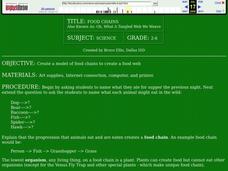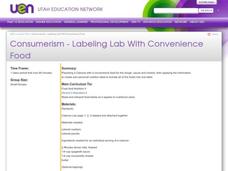Curated OER
Seeds - What are Seeds?
At minimum, beginning botanists learn the terminology used when discussion seed germination. This set of slides lists basic seed parts, requirements for germination, steps of the process, and then it differentiates between monocot and...
Curated OER
From the Farm to Your Table: Where Does Our Food Come From?
Students discover where the food they eat comes from. Using maps, they identify the agricultural areas of the United States and the products that are grown in each area. Using the internet, they research how food gets to America from...
California Academy of Science
Our Hungry Planet: Design Thinking Challenge
Scholars investigate an issue associated with food systems and design their own solutions. Working collaboratively, they follow each step in the design process to complete the 10th lesson of the 13-part Our Hungry Planet series.
Food Project
Introduction to Sustainable Agriculture and Food Systems
A series of hands-on, outdoor activities increase understanding of agricultural terms, soil management, pest control, and more. Plan ahead for this one as it requires a number of supplies and could be messy. Activities include...
Curated OER
Food Safety-Consumers Need the Facts
High schoolers begin by completing a survey asking them to rank their concerns about commercially prepared foods. They develop a definition of relative risk, and complete the "Pro or Con" worksheet. Students work in groups to make a...
Curated OER
Chemistry of Food
In this chemistry of food learning exercise, students complete 20 various types of questions related to food and nutrition. First, they complete a crossword puzzle with vocabulary terms. Then, students use the figure shown to write the...
Curated OER
Food Insecurity in a Global World: Perspectives from Africa
Students investigate food shortages. In this global issues lesson, students examine how food scarcity issues have impacted the people of Easter Africa. Students use the information they gather to determine methods of providing food to...
Curated OER
Cooking with WIC Foods
Students share ideas about how they use their WIC foods. In this adult health lesson, students discuss benefits of eating a healthy diet. They create recipes using WIC food supplies.
Curated OER
Food Insecurity in a Global World: Perspectives from Africa (Lesson One)
Learners investigate food scarcity. For this global issues lesson, students examine food scarcity issues that have impacted the people of Eastern Africa. Learners use the information they gather to determine methods of providing food to...
ARKive
Biodiversity and Evolution – Darwin’s Finches
Teens experience natural selection firsthand (or first beak) in an activity that has them act as finches foraging for food. Using different household items to act as different beak styles, your little finches will collect as much food...
Curated OER
Bud the Spud Moves West
As part of a unit on Canadian agriculture, this focuses on how potato farms have increased in the west. Pupils participate in a discussion about the impact of consumer demand on production, and then they read an article about potato...
Curated OER
Step by Step
Students explore agriculture by creating a food production diagram. In this farming lesson, students read assigned text about the entities that assist in food production companies such as farmers, truckers and supermarkets. Students...
Towson University
The Crucial Concentration
Which sports drink provides the best pick-me-up after the big game or grueling workout? It may not be the one you'd think! Food science is the focus in a surprising lab activity. Pupils use colorimetry to determine the amount of protein,...
National WWII Museum
Rationing by the Numbers: Quantitative Data as Evidence
What was it like to live on wartime rations in the United States during World War II? Young historians find out by exploring how those on the home front bought food thanks to the ration system. Other data includes statistics on car sales...
Curated OER
Food Systems Feed the World
Students discover how getting food from farm-to-fork involves several steps and many hands. For this interactive food chain lesson, students respond to a series of questions about food distribution then work collaboratively to create a...
Curated OER
Consumerism - Labeling Lab With Convenience Food
Students examine the differences between convenience food and food that has to be prepared in order to use it in another recipe. In groups, they make a calzone using only convenience food. After baking, they work together to make their...
Curated OER
Wow! You're Eating Geography
Students examine patterns of food producing areas, and identify foods that are grown locally, in the U.S., and around the world. They map and graph the major food crops of their local area, the U.S., and other countries, and discuss the...
Curated OER
Everybody Needs a Little Sunshine
Three activities introduce upper elementary ecologists to photosynthesis and food webs. In the first, an experiment is set up to determine how plants respond to different types of light. In the second, they connect organism cards with...
Curated OER
The Global Precipitation Measurement Mission (GPM) Lesson
Introduce your class to one of the ways that technology is benefiting humanity. The Global Precipitation Measurement Mission involves the data collected by nine satellites from different countries with a united focus on studying world...
Alabama Learning Exchange
Nature's Life Cycle
Become a member of the Pollution Patrol and stand up to litter! After discussing the life cycle of seeds and discussing how plants figure into the food chain, young conservationists engage in several activities involving podcasts,...
Curated OER
Mouse Roulette
Students explore the food chain. To gain an understanding about the food web, students participate in a simulation where owlets are being fed by adult owls. Afterward, students examine the results of the role play to determine whether an...
Polar Trec
Why Can’t I Eat This Fish?
Can turning on the television lead to toxins in the food supply? The lesson offers an opportunity for young scientists to complete guided research. A worksheet lists each question as well as the web page necessary to answer the question....
Council for Economic Education
What's the Big Deal about Spices?
Today's gourmands don't consider spices to be the equivalent of silver and gold. During the middle ages, however, these commodities were precious. People back then used spices in religious ceremonies, to cure rotten food, and as a show...
Other popular searches
- World Food Supply
- Nation¿â¿â¿s Food Supply
- Food Supply Chain
- Global Food Supply
- Animals Food Supply
- Africa Food Supply
- Nation?s Food Supply
- Extreme Weather Food Supply
- Extreme Weather, Food Supply
- Scarce Food Supply
- Drought Effect on Food Supply

























